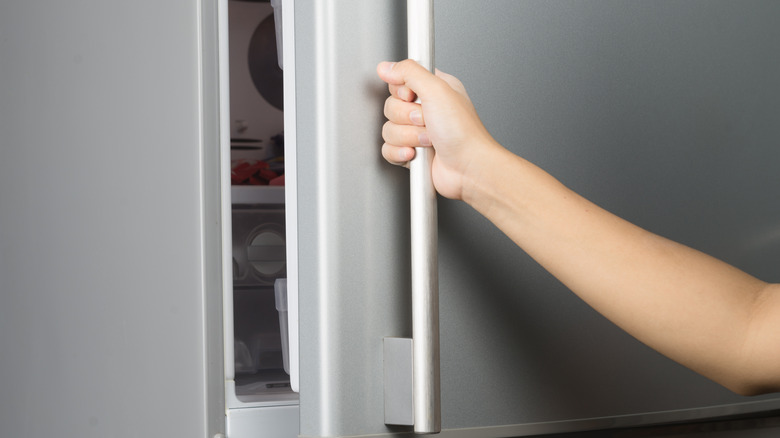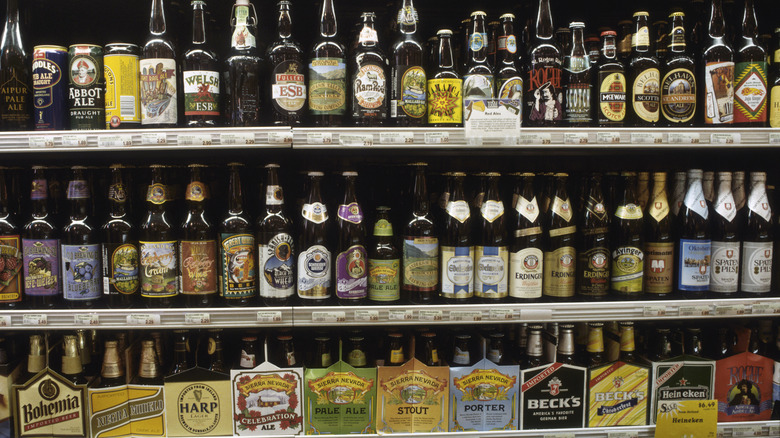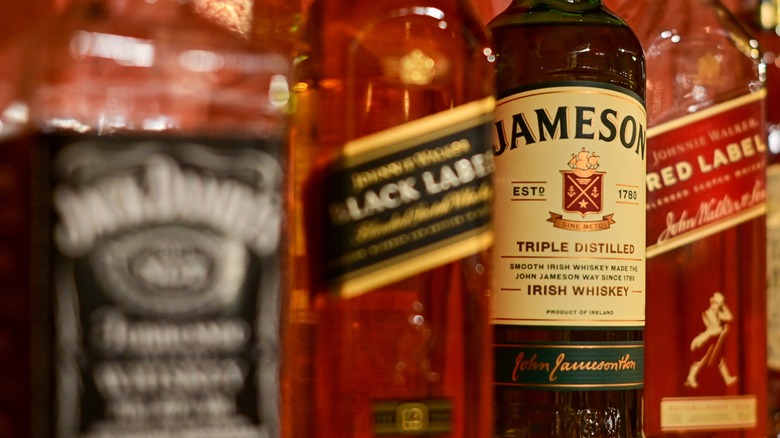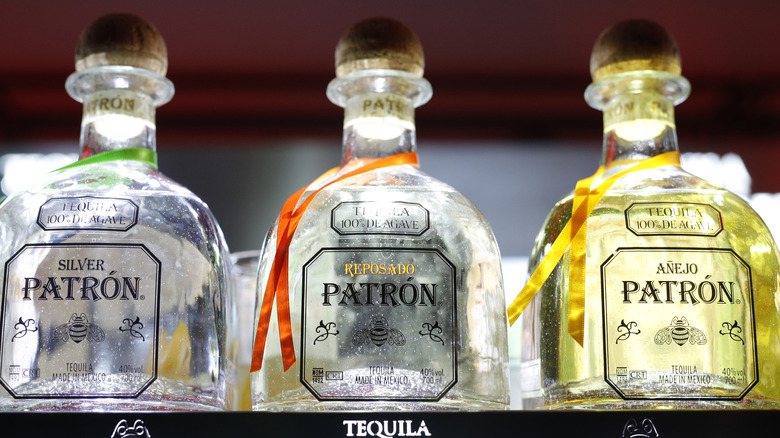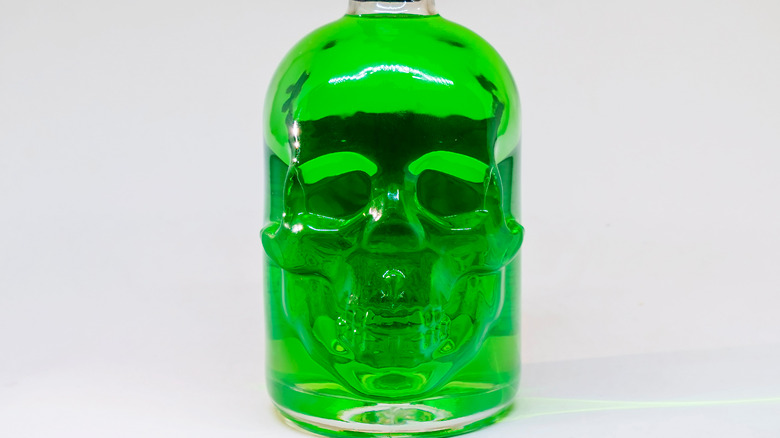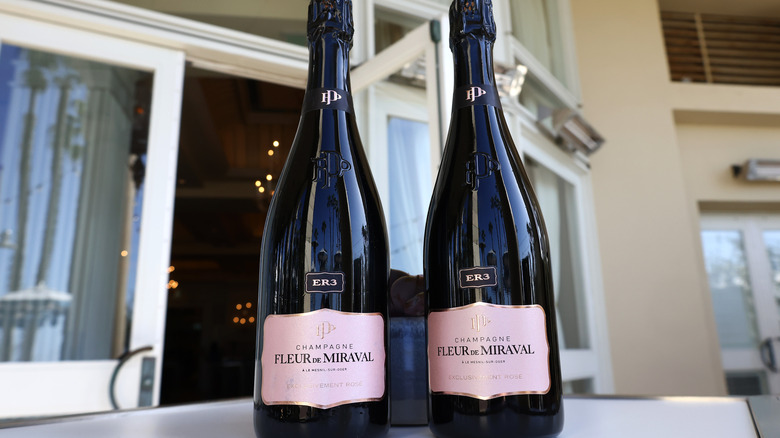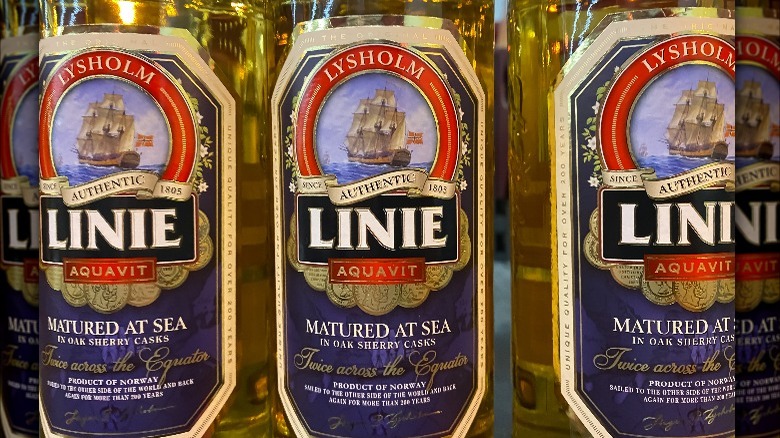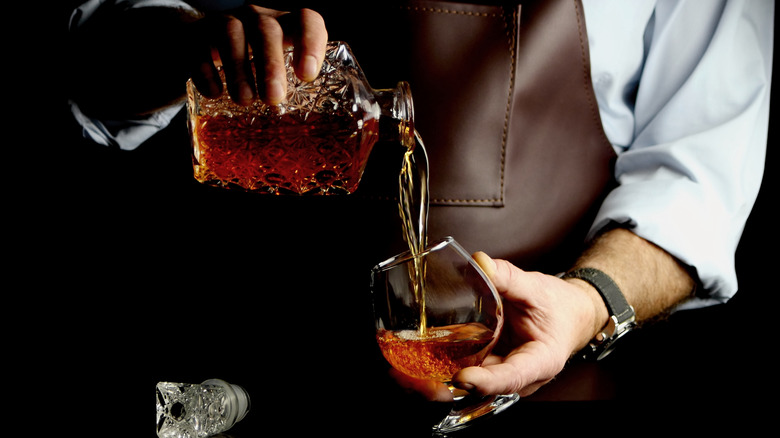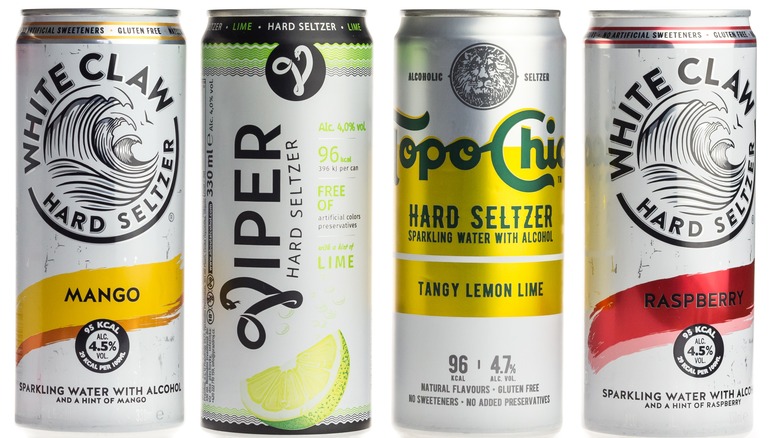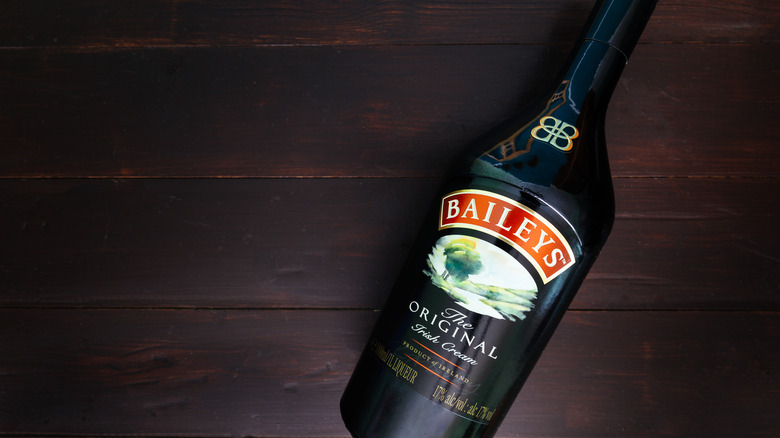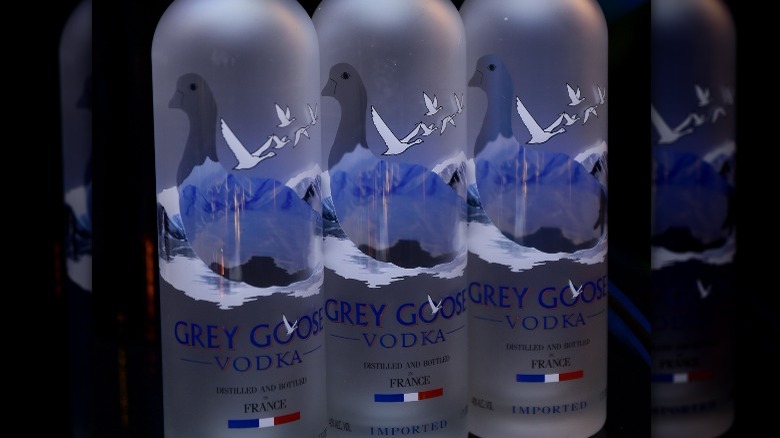Alcohols You Should Never Put In The Freezer
We have to ask: What would possess a person to freeze an alcoholic beverage (or at least attempt to)? Frankly, unless your alcohol consumption goals revolve entirely around a pain-and-taste-dulled inebriation (which it might!), we'd say there's little reason to consider storing any alcohol in the freezer.
Of course, not all drinkers are likely to agree with that stance. In fact, we'd venture a guess that numerous folks actually prefer storing booze bottles in the freezer — and can admit there's a certain bit of common sense-type logic to that thought process. Alcohol's freezing point is drastically lower than water's, after all (roughly -174 degrees Fahrenheit for alcohol, versus 32 degrees Fahrenheit for water), meaning many high-proof liquors can withstand the temperature of a conventional freezer without, well, freezing.
Now, since there are no real health risks involved with throwing back a shot of (legitimately) ice-cold rum — or with any alcohol stored in the freezer, for that matter — we're not interested in fully converting those alcohol-in-freezer acolytes. Yet anyone determined to use the freezer for liquor storage should recognize some alcohols simply don't belong in a sub-freezing environment. With that in mind, we compiled a list of various types of alcohols best kept above 32 degrees Fahrenheit, and present those alcohols you should never put in the freezer.
Beer
Even if you haven't thought about basic scientific concepts since high school, there's a decent chance you're aware that water expands when it's frozen. Given this fact, it's not incredibly difficult to determine the crux of our issue with putting beer (a lower-proof product that contains a higher percentage of water than many other alcohols) in the freezer: Beer may actually freeze. When that happens, naturally, the liquid inside a beer can or bottle will swell — which, in turn, can cause those containers to burst.
Frankly, the internal pressure of frozen beer (sealed inside aluminum or glass) is often too great to sustain over time, eventually resulting in an exploding can or bottle. Of course, even if you aren't forced to clean slushy bits of beer from every corner of your freezer (and potentially shards of glass, as well), a frozen brewski may still break its seal — leaving you with a flat, futile product devoid of carbonation upon defrosting.
Now, since we love an ice-cold beer as much as the next person (we're not British, after all), we can understand one's impulse to store their favorite beer in the freezer. But it's simply not worth the risk. So follow our lead, and stick your beers in the fridge.
Whiskey
As we noted in the introduction, a person driven solely by the end result of drinking alcohol — IE getting hammered — may prefer to consume it as frigid as possible. In that regard, a higher-proof liquor (such as whiskey) likely appears ideally-suited for freezer storage, since it won't freeze entirely, or spoil in any capacity. But if you're of the mind that a whiskey's complexities should be celebrated and embraced (which we are), you'll want to keep this type of alcohol away from your freezer.
Consider, if you will, the amount of time and effort involved in the production of a truly spectacular whiskey — Johnnie Walker Black Label, for instance. The numerous intricate flavor notes found in each bottle of this immensely popular blended whiskey take years to develop (which is true of most top-notch whiskeys). But putting this alcohol in the freezer will completely deaden those subtleties, defeating the entire purpose of buying a quality bottle of whiskey — and spending a pretty penny — in the first place.
If you're not a fan of whiskey but are determined to get drunk drinking it, storing it in the freezer will indeed act like a spoonful of sugar (and help the medicine go down). Of course, we have to wonder why such a person would choose whiskey at all — and recommend a less intense, freezer-friendly alcohol instead.
Tequila
While there's a grain of truth in the old adage that we eat with our eyes, perhaps the notion that we eat with our nose should be just as prominent. After all, an astounding 80% of one's sense of taste is derived from the olfactory system (or your sense of smell) — meaning the aromatic qualities of certain alcohols are essential to the entire experience. Unfortunately, those scents may disappear with freezer-stored alcohol, which is precisely why you should never put tequila in the freezer.
Now, it's not just a matter of diminished nasal recognition that makes tequila a poor choice for the freezer (although that aspect is undoubtedly important). After all, the subtle flavors in the actual alcohol are just as paramount to enjoying a quality tequila — nuances that are lost when the liquor's ice-cold.
Since putting tequila in the freezer removes "the aromas and components tequila is made of," as Patrón's director of production Antonio Rodriguez told Cosmopolitan in 2017, there's genuinely no real rationale to do so. Obviously, this may not matter to someone who only enjoys tequila between a salt lick and lime wedge. But if you prefer consuming the product exactly as it was intended, keep your tequila at room temperature.
Sake
Is there a reason why someone would seek out a non-U.S.-created drink — only to completely eschew the item's expected method of ingestion from its native culture? We can't say. But along those lines, we can say any person who purchases a bottle of sake (the Japanese-born fermented rice alcohol) should follow Japan's lead with the product. So while you're welcome to put sake in the freezer (it's still a free country, right?), for quality purposes, it's best stored between 40 degrees Fahrenheit and 60 degrees Fahrenheit — or well above a freezer's temperature.
Sake's alcohol content comes closer to wine than hard liquor (or consistently below 40 proof), meaning there's a chance the alcohol could, in fact, become frozen in your freezer. Seeing how sake is often sold in glass bottles (and water, like that in sake, expands when frozen), it's clearly a bad match for extreme cold — unless you want to end up with a freezer full of sake-frosted bits of glass, that is.
Since sake's delicate nature is also unlikely to withstand a freezer's temperature without a noticeable drop in quality, it's simply not worth storing there. So the next time a friend asks you to 'sake it to me' (as the old joke goes), make sure it's not from the freezer.
Absinthe
We don't entirely understand the hullabaloo surrounding absinthe, nor have we ever experienced its supposed hallucinogenic properties (to our general dismay). But we can still admit the excessively-boozy, neon-green-colored liquor is one-of-a-kind. Additionally, since it's generally bottled at 100 proof or higher, absinthe may seem perfect for the freezer. Yet anyone hoping to maximize their bottle of the emerald-hued alcohol should heed our advice and keep it out of the freezer (or even the fridge).
Presumably, most folks would prefer to preserve absinthe's trademark anise flavor (which, like licorice, comes from the flavoring compound anethole). But those crucial compounds begin to break down in cooler temperatures. In other words, if the alcohol is kept in the freezer, the very flavor notes absinthe fans relish will almost certainly be diminished — if not completely destroyed.
Frankly, if you're looking to extend the liquor's shelf-life by putting it in the freezer, its high alcohol content makes that consideration moot. In fact, since a just-less-than room temperature environment is ideal, you can rest assured your absinthe will be just fine outside the freezer — leaving the drink's finer details intact.
Champagne
Even if the world avoids a potential champagne shortage in 2023, we'd imagine most folks are apt to save their bottles of the fizzy-bubbled beverage for a special occasion. In that sense, ensuring your champagne remains at its peak whenever you're ready to enjoy it (be it two weeks after purchase, or two decades) is vital. One way to ensure this happens is by keeping champagne out of the freezer — helping it retain quality while avoiding a shattered mess of broken glass if the alcohol bursts.
Now, as we've noted several times already (and may mention again!), the nature of frozen water means a lower-proof alcohol (such as champagne) isn't just at risk of actually freezing in a freezer — it could cause its container to rupture, as well. Of course, while that straightforward concern is both reasonable and understandable, it isn't the only reason to keep champagne away from the appliance.
In fact, another reason to avoid storing champagne in the freezer is the risk of prematurely popping its cork, thus reducing the carbonation so crucial to enjoyment. Because, quite frankly, who wants to celebrate life's precious moments with a sad, non-bubbly glass of champagne?
Aquavit
We didn't always discover a universal consensus against (or for) storing certain alcohols in the freezer when researching this article. Case in point: Aquavit, the famous Scandinavian liquor some believe should be served from (and therefore kept in) the freezer. Of course, whenever there's doubt, we try to defer to the experts. And according to Frithjof Nicolaysen, vice president of the Norwegian beverage company Arcus, a freezer is the last place one should put their aquavit.
In fact, Nicolaysen told The Washington Post in 2010 (via The Denver Post) that the mere mention of storing aquavit in the freezer is "a sacrilege for those of us who make it." Now, if you're doing precisely what a leading aquavit producer (from Norway) recommends not to do with the alcohol, we can't stop you. Yet why bother purchasing an imported bottle of foreign-made liquor only to thumb your nose at the preferred method for drinking it?
While we've yet to have the pleasure of sipping this legendary Scandinavian alcohol ourselves, we know where we'll keep aquavit once we finally get our hands on a bottle: Anywhere but the freezer.
Brandy
When high society types enjoy a nice after-dinner cigar and drink — a la Jack Dawson (Leonardo Dicaprio) during his trip to the first-class dining room in "Titanic" — they usually enjoy their snifters of brandy neat (or without ice). This isn't by accident, of course, since brandy is generally consumed at room temperature — meaning there's no legitimately conceivable reason to keep this alcohol in the freezer.
Brandy isn't consumed exclusively sans ice, of course, and there are a number of brandy-based cocktails that utilize ice during the mixing process. But seeing how the general rule of thumb for this classic, floral liqueur is to sip it straight at (or near) room temperature, well ... you'll hardly earn a reputation as a brandy connoisseur if you store this alcohol in the freezer.
Now, if you don't care about your standing in the brandy-based community, feel free to store any and all bottles in your freezer. But if you're hoping to enjoy every nook and cranny of flavor found in a glass of brandy, keep it in your pantry, not the freezer.
Mezcal
Have you ever finished a bottle of tequila, then polished it off with the elusive worm — you know, the one rumored to be found at the bottom of certain tequila batches? We'd bet not— though that's mainly because it's mezcal, not tequila, that sometimes contains the worm-like creature (which is actually a moth larva, not a worm). In fact, while mezcal and tequila may be mistakenly discussed as one and the same on occasion, a number of distinctive differences differentiate the two alcohols — though neither Mexican liquor should be stored in the freezer.
Now, since a preferred method for mezcal consumption involves drinking it at room temperature, it's unclear why a person would even consider putting this alcohol in the freezer. After all, you'd need to wait an exorbitant amount of time before a freezer-kept bottle of mezcal is ready to sip — and who wants to wait when they're jonesing for a shot of booze?
Clearly, we think it's worth honoring the preparation and heritage of certain alcohols, and mezcal is no exception. So if you're anything like us, do what's best for the mezcal and never put it in the freezer.
Hard seltzer
We'd have to imagine some people put alcohol in the freezer hoping it will act as an insta-cooler for any warm (and therefore icky) beverages. But that impulse to try and circumvent the laws of physics by instantaneously chilling an alcoholic beverage won't result in the pleasantly-cool liquid you envision — and hard seltzer is no exception. Hence, for reasons akin to beer and champagne, we'd advise you never to put any hard seltzer cans in the freezer.
Obviously, by now, we've established what's likely to happen when a carbonated drink is frozen — it'll eventually erupt. In that regard, the general risk associated with putting a lower-proof alcohol like hard seltzer in the freezer is fairly clear (just like the drink itself!).
Of course, since hard seltzer isn't what we'd describe as a sophisticated beverage, the only real concern lies in a potential frozen mess, rather than a drop in quality. So while a previously-frozen hard seltzer may taste just fine, it's just as unlikely to survive the freezer in one piece — so keep it in your refrigerator.
Irish cream liqueur
Certain foods and drinks seem destined for cold storage, particularly those items likely to spoil when kept above 40 degrees Fahrenheit. In that sense, it's perfectly plausible to believe an Irish cream liqueur (be it Bailey's or another brand) requires a spot in the fridge — or even the freezer — to maintain freshness. But the alcohol in this, well, alcohol allows it to remain safe and palatable for up to two years at room temperature, making refrigeration (or freezing) a wholly unnecessary step.
More than that, actually, the strong likelihood this dairy product will separate while in the freezer means the overall taste and feel could be altered (for the worse) once it's removed — essentially ruining your Irish cream liqueur before you sip it. Additionally, considering this alcohol is often added to warm beverages, we're hard-pressed to name any genuine reason a person would want to put their Irish cream liqueur in the freezer.
If the thought of keeping a cream-based item in your pantry makes you squeamish, feel free to store it in your fridge. But since we'd guess you're keen to drink Irish cream liqueur the same way you purchased it, do yourself a favor, and keep it out of the freezer.
Premium vodka
If there's one single alcohol we can recommend for freezer storage, it would be cheap, low-brow vodka — like those $10-and-under bottles that continue to haunt our high school nightmares. Of course, the inverse of storing a low-cost (and terrible-tasting) vodka in the freezer is what to do with this alcohol's tippity-top brands: Namely, don't put it in the freezer. Because like so many other top-shelf liquors, you'll only reduce the very flavors you spent money to enjoy if you do so.
Now, to be perfectly clear, when we say you should never store vodka in the freezer, we really do just mean expensive, high-quality vodkas (such as Grey Goose or Belvedere). In fact, if we're talking about a bottle of, say, Popov, we'd implore you to store that barely-drinkable slosh in the freezer, as it'll help ease the basement-level product's inevitable burn.
Still, as we've wondered with other costly alcohols, what's the point of draining your bank account to obtain a fancy bottle of vodka ... only to turn around and deliberately dull the drink's delicateness by putting it in the freezer? Frankly, if you want to get your money's worth when it comes to premium vodka, steer clear of freezer storage for this clear liquor.
Static Media owns and operates Mashed, /Film, and TastingTable.
